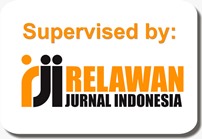ANALYSIS OF ETHICAL CLIMATE, SPIRITUALITY IN THE WORKPLACE, AND ORGANIZATIONAL COMMITMENT TO DEVIANT BEHAVIOR OF ASN BLITAR REGENCY GOVERNMENT
Abstract
This research aims at examining and analyzing: (1) the effect of ethical climate on deviant behavior; (2) the effect of workplace spirituality on deviant behavior; (3) the effect of organizational commitment on deviant behavior; (4) the effect of ethical climate on workplace spirituality; (5) the effect of ethical climate on organizational commitment; (6) the effect of ethical climate on deviant behavior mediated by workplace spirituality; (7) the effect of ethical climate on deviant behavior mediated by organizational commitment. This research using quantitative study with SmartPLS analysis methode, and the population is 207 people of the regional unit apparatus holding the structural positions of echelon 2b, 3a, and 3b in Blitar Regency Government, and 67 of them are taken as the samples. The results of the study show that ethical climate does not influence deviant behavior, but workplace spirituality affects deviant behavior. Meanwhile, organizational commitment does not affect deviant behavior, but ethical climate affects organizational commitment. In addition, ethical climate influences workplace spirituality, also the organizational commitment. Furthermore, the results of the study also reveal that the ethical climate influences deviant behavior mediated by workplace spirituality, but not through organizational commitment.
Keywords: Ethical Climate, Workplace Spirituality, Organizational Commitment, Deviant Behavior
Full Text:
PDFReferences
Ahmad A and Omar Z. (2014). Reducing deviant behavior through workplace spirituality and job satisfaction, Asian Social Science, 10, 19, 107-112.
Appelbaum, Deguire and Lay (2005). The Relationship of Ethical Climate to Workplace Deviant Behavior. Matthieu Corporate Governance, 5, 4.
Appelbaum SH, Iaconi GD and Matousek A. (2007). Positive and negative workplace deviant behavior: causes, impacts, and solutions. Corporate Governance. Vol. 7 No. 5 2007, pp. 586-598.
Ashmos and Duchon (2000). Spirituality in the workplace: a conceptualization and measurement" Journal of Management Inquiry. Vol 9 No 2. pp 134-45
Bennett RJ and Robinson SL. (2000). Development of a Measure of Workplace Deviance. Journal of Applied Psychology 2000, Vol. 85, No. 3, 349-360
Blau (1964). Social exchange theory: An Interdisciplinary Review, in Cropanzano, and Mitchell, M.S. (2005). Journal of Managenet, 31: 874
Burack (1999). Spirituality in the workplace. Journal of Organizational Change Management. Vol. 12 Iss: 4, pp.280 - 292
Cheang S.H and Appelbaum (2015). Corporate psychopaths: deviant workplace behavior and toxic leaders - part one. Published by Emerald Group Publishing Limited
Cohen, A. (1993). Job commitment in relation to exit intentions and union effectiveness. Journal of Business Research, 26, 75-90
Cullen. J Parboteeah and Victor (2003). The effect of Ethical Climate on Organizational Commitment: an analysis of two studies "Journal of Business Ethics", Vol 46 No 2, pp 127-14.
Fisher and Lovell, A (2003). Business Ethics and Values. Pearson Educational Limites, Essex
Garry A. Gelade, Paul Dobson, Patrick Gilbert (2006). National Differences in Organizational Commitment Economic Effects, Personality Products, or Cultural Consequences? Cross-Cultural Journal. Sage Publication
George, Larson, Koening, McCullough. (2000). Spirituality and Health: What we know, and what we need to know. Journal of Social and Clinical Psychology. Vol 19 N0 1. pp 102-116
Ghozali (2008). SEM Alternative Methods with PLS. Publisher of Diponegoro University Publishing Agency ISBN: 979.704.250.9
Hartono, J., and Abdillah, W. (2009). Concepts and Applications of PLS (Partial Least Square) for Empirical Research. 2ND EDITION. BPFE. Yogyakarta
Krisnakumar, S and Neck. C.P (2002). The "what", why" and "how" of spirituality in the workplace. Journal of Managerial Psychology. Vol 17 (3), 153-164
Locke, E. A., and Bryan, J. (1968). Goal setting as a determinant of the effect of knowledge of values on performance. American Journal of Psychology, 81, 398-406.
McGhee and Grant (2008). Spirituality and ethical behavior in the workplace: Wishful Thinking or Authentic Reality. Electronic Journal of Business Ethics and Organizational Studies. Vol 13 No 2
Neck and Milliman (1994). Though Self Leadership: Finding Spiritual Fulfillment in Organizational Life. Journal of Managerial Psychology Vol 9 No 6 pp 9-16
Government Regulation No. 42 Year 2004 on the Development of Corps Spirit and Code of Ethics of Civil Servants
Peterson D (2002). Workplace Misbehavior and Organizational Ethical Climate". Journal of Business and Psychology, Vol 17 No 1. pp 47-61
Randall, L., and Senior, M. (1994). A model for achieving quality in hospital hotel services.International Journal of Contemporary Hospital Management, 6, 68-74.
Robbins, S. P. and M. Coulter (2005). Management, 8th Edition (Pearson/Prentice Hall, Upper Saddle River, NJ).
Robbins S.P (2015). Handbook of Organizational Behavior 16th Edition. Published by Pearson. Inc.
Robinson, S. L. and Bennett, R. J. (1995). A Typology of Workplace Disruptive Behavior: A Multidimensional Scaling Study. Academy of Management Journal 38: 555-572.
Robinson and Bennet (2000) Development of a Measure of Workplace Deviance. Journal of Applied Psycology. Vol 85 No 1. Page 349-60
Rousseau D M (1995). Psychological Contracts in Organizations: Understanding Written and Unwritten Agreements, Newbury Park, Sage, CA.
Sekaran, Uma. (2003). Research Methods for Business: A Skill Development Approach, Fourth Edition, New York: John Willey and Sons, Inc.
S Krisnakumar and CP Neck (2002). What, why and how of spirituality in the workplace. Journal of Managerial Psychology Vol 17 no 3, pp 153-164.
Sugiyono (2008). Quantitative, Qualitative Research Methods. Alfabeta Publisher. Bandung.
UU No. 2 of 2014, concerning Amendments to Law No. 23 of 2014
UU No. 5 of 2014 concerning State Civil Apparatus
UU No. 18 of 2016 concerning Regional Apparatus Organization
Victor and Cullen (1987). The Organizational Bases of Ethical Work Climates. Administrative Science Quartely, 33.1 pg.101.
DOI: https://doi.org/10.31846/jae.v12i2.761
Refbacks
- There are currently no refbacks.

This work is licensed under a Creative Commons Attribution-NonCommercial-NoDerivatives 4.0 International License.
e-Jurnal Apresiasi Ekonnomi Indexed by:












